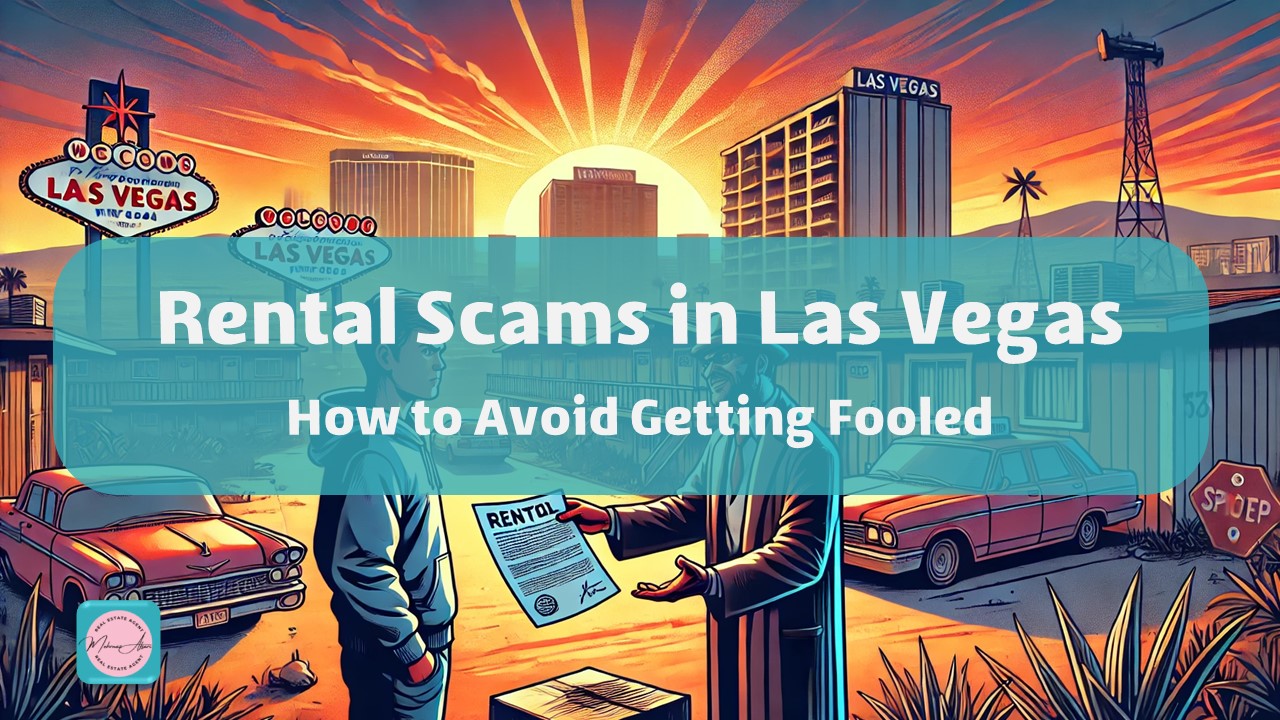Finding a place to rent in Las Vegas should feel exciting—not stressful. But for many renters, the search can turn into a nightmare thanks to a rise in rental scams in Las Vegas. Scammers know exactly how to prey on people in a hurry or unfamiliar with the city. From fake listings to impersonated landlords, the tricks keep evolving. That’s why knowing how to spot red flags and take preventative steps is key. In this guide, we’ll walk you through the most common scams, warning signs, and reliable ways to protect yourself before signing any lease or handing over cash.
Why Rental Scams Are a Growing Concern in Las Vegas
The rental market in Las Vegas has seen a surge in demand over the past few years. With that boom comes a dark side—scammers who are getting smarter, faster, and harder to detect. This city’s unique mix of transient residents, out-of-town renters, and a hot housing market makes it an ideal playground for rental fraud. Technology, while helpful in many ways, also opens the door to deception—especially when deals seem too good to be true.
Vegas Housing Demand and Scam Opportunities
As more people move to Las Vegas for job opportunities, better weather, or simply a change in lifestyle, the competition for affordable rentals has spiked. Scammers take advantage of this urgency. When renters feel pressured to lock down a place quickly, they often skip critical steps like verifying ownership or visiting the property in person.
Online Listings and Fake Agents
Digital convenience comes with a price. Many scams start on popular platforms where listings can be created with fake photos and convincing descriptions. Scammers pose as landlords or agents, often using spoofed phone numbers and email addresses. They’ll say they’re “out of town” and pressure you to send money to “hold” the property before someone else snags it.
Tourist Turnover and Vulnerability
Las Vegas sees a constant flow of newcomers—students, seasonal workers, and tourists hoping to settle short-term. Many of them are unfamiliar with local rental norms and are easy targets. Scammers know this and tailor their schemes to sound credible to someone new in town, using urgency and fake legitimacy to close a “deal” fast.
READE MORE: How to Find the Best Schools in Las Vegas
Most Common Types of Rental Scams in Las Vegas
Rental scams in Las Vegas have taken many forms, each designed to exploit trust and urgency. Whether it’s a deal that looks too good to pass up or a “landlord” who seems overly eager, the goal is always the same: take your money and disappear. Understanding the specific types of scams can help you avoid becoming the next victim.
Fake Listings and Phantom Rentals
One of the most common scams involves properties that simply don’t exist—or are already occupied. Scammers copy photos from legitimate listings or invent entire apartments, then post them on high-traffic platforms. When you reach out, they’ll create a story: they’re overseas, the unit is in high demand, and you need to act fast. Once they receive your deposit, they vanish.
Hijacked Ads (Real Listings, Fake Landlord)
This scam is trickier because it involves real properties. Scammers find legitimate listings, then repost them with their own contact info. They might even use the owner’s name to build trust. Victims often don’t realize anything’s wrong until they show up at the property and the real owner has no idea what’s going on. This one feels especially cruel because it plays on a sense of security—after all, the listing looked real.
Upfront Deposit Scams
These fraudsters demand a deposit before you’ve seen the property or signed anything official. They use urgency as leverage: “I have five other people interested,” or “First to send the deposit gets the place.” But once you pay, the communication stops. No keys, no lease, no refund.
Application Fee Frauds
Some scammers pose as landlords or property managers and collect application fees for properties that aren’t even available. You’ll be asked to fill out fake forms and pay a fee—usually non-refundable. Since many renters are willing to pay a small fee upfront, this scam can rack up quick money for the fraudster with minimal risk of being caught.
Real Stories: Victims of Rental Scams in Las Vegas
Behind every statistic is a person who lost money, trust, and peace of mind. These real-world cases from Las Vegas rental scams show just how creative and manipulative fraudsters can be. By learning from others’ experiences, you can better protect yourself from falling into the same traps.
Case 1 – Craigslist Scam
Amanda, a single mother relocating from California, found what seemed like the perfect apartment on Craigslist. The price was below market, the photos looked legit, and the “landlord” was quick to respond. He claimed he was out of the country and asked for a deposit via wire transfer to hold the unit. When Amanda arrived in Vegas with her U-Haul, the address led her to a confused homeowner who had never listed the place. Her $1,400 was gone.
Case 2 – Impersonated Property Manager
James, a college student new to town, responded to an ad posted on a reputable site. The person he met wore a branded polo shirt, gave him a tour of the unit, and even handed over what looked like official leasing paperwork. After paying the deposit and first month’s rent, James showed up on move-in day only to find that the real management company had no record of him. The man he trusted was a con artist—he even used a fake badge and email domain.
Case 3 – Foreign Tenant Trap
Mina, an international student from India, found a rental through Facebook Marketplace. Because of time zone differences and visa delays, she couldn’t view the property in person. The “landlord” asked for a security deposit to reserve the apartment, promising to send the lease afterward. After she paid, all communication stopped. Stranded and without housing when she landed, Mina had to scramble for emergency accommodation.
Red Flags to Watch Out for When Renting
Not every good deal is a trap—but in Las Vegas, if a rental feels a little too easy, it’s worth pausing. Scammers rely on catching people off guard. Knowing the warning signs can help you slow down, ask the right questions, and avoid costly mistakes. Here are the red flags that should immediately set off your internal alarm.
Prices Too Good to Be True
If the rent is significantly lower than similar listings in the same neighborhood, something’s off. Scammers use bargain pricing to draw you in quickly, hoping you’ll skip due diligence in fear of missing out. Always compare listings and trust your gut—Vegas has deals, but not miracles.
No In-Person Viewings Allowed
Legitimate landlords want you to see what you’re renting. If someone refuses to show you the place in person—or says they’re out of town and can’t arrange a tour—walk away. Some might offer video tours, but that alone isn’t enough. In-person access is key to verifying the property is real and available.
Pressure to Act Fast or Pay Now
Scammers often sound urgent: “Others are interested,” “I need the deposit today,” or “First to pay gets it.” This tactic is designed to short-circuit your judgment. A real landlord won’t rush you into a decision or demand money before a proper lease is signed and verified.
Unverifiable Ownership
Always check who actually owns the property. If the person you’re dealing with can’t provide documents, avoids your questions, or gives vague answers about ownership, that’s a major red flag. Cross-check with public property records or ask for proof of authority to rent out the home.
How to Verify a Legitimate Rental Listing in Las Vegas
Before signing anything or sending money, it’s crucial to make sure the rental listing—and the person offering it—is legit. In a city like Las Vegas, where listings move fast and scams move faster, taking a few minutes to verify details can save you thousands. Here’s how to double-check a rental step-by-step.
Checking Property Records
Start by verifying who owns the property. You can access Clark County Assessor’s Office records online. All you need is the property address to see the legal owner’s name. If the person claiming to rent the unit isn’t listed, ask for proof that they have the right to lease it—like a notarized authorization or management contract.
Verifying Agent License with Nevada Real Estate Division
If you’re dealing with someone who claims to be a property manager or real estate agent, run their name through the Nevada Real Estate Division website. You’ll find licensing info, disciplinary records, and whether they’re legally allowed to handle rentals. A licensed agent has a lot more to lose if they commit fraud—unlike a random Facebook profile.
Using Trusted Rental Platforms
Stick to platforms that offer some level of verification, renter protection, or escrow options. Sites like Zillow, Apartments.com, and Realtor.com are safer bets than Craigslist or Marketplace. Be wary of listings with limited contact info, inconsistent images, or vague addresses. The more transparency, the better.
What to Do If You’ve Been Scammed
It’s painful, frustrating, and embarrassing—but if you’ve fallen for a rental scam in Las Vegas, you’re not alone, and you do have options. Acting quickly not only gives you a better shot at recovering your money but also helps stop the scammer from targeting someone else.
Who to Report to (Police, FTC, Local Authorities)
Start by filing a report with the Las Vegas Metropolitan Police Department. Then, head to the Federal Trade Commission’s complaint portal to document the scam. If you used a rental platform, report it there too—they may remove the listing and assist in tracking down the scammer. Don’t forget your bank or payment service—they might freeze or reverse transactions in some cases.
Legal Options and Tenant Protections
You may be eligible to file a civil claim in small claims court for amounts under a certain limit. While it won’t guarantee recovery, it creates a paper trail. Also, some states and cities—including Las Vegas—have tenant protection hotlines and legal aid organizations that can guide you through the process.
Sharing Your Experience to Warn Others
Once you’ve taken action, consider sharing your story on platforms like Reddit, Yelp, or even community Facebook groups. It’s not about venting—it’s about warning others who might fall for the same setup. Many victims report seeing the same scam pop up weeks later with slightly different details. Your post might save someone else from making the same mistake.
How Real Estate Agents and Property Managers Can Help
When you’re navigating the wild waters of the Las Vegas rental market, having a pro in your corner can make all the difference. Real estate agents and licensed property managers aren’t just about showing you places—they’re your first line of defense against scams. Their experience, legal knowledge, and access to verified listings offer a layer of protection that solo searching often lacks.
Screening Listings
Agents have access to databases like the MLS (Multiple Listing Service), where only verified listings get posted. That means no fake addresses, no stolen photos, and no mystery landlords. They can also spot red flags that an average renter might miss, especially in shady or oversaturated markets.
Secure Transactions
Licensed professionals handle payments through secure systems—not Venmo or sketchy wire transfers. They ensure that your deposit goes into a trust account and that everything is documented. It’s not just about safety—it’s about peace of mind.
Verified Rental Agreements
No vague promises or fishy PDFs here. A professional will walk you through a legal, binding rental agreement that protects both parties. They’ll explain the fine print, set clear expectations, and help you avoid getting locked into a lease with unfair terms—or a scammer with no lease at all.
Tips to Stay Safe When Renting in Las Vegas
Even if you’re going the DIY route, there are smart steps you can take to avoid becoming a victim. Las Vegas may be known for its glitz and deals, but when it comes to rentals, slow and steady wins the race. Use these tips as your renter’s rulebook.
Meet Landlords in Person
Face-to-face meetings can reveal a lot. A real landlord or agent won’t dodge you or come up with excuses to avoid showing the property. Meet at the actual rental unit, ask direct questions, and observe how they respond. If something feels off—it probably is.
Never Pay in Cash or Gift Cards
No legitimate rental requires payment in untraceable ways. If someone asks for cash, prepaid debit cards, or gift cards, that’s a giant red flag. Use traceable methods like checks, credit cards, or official bank transfers. And always get a receipt.
Use Rental Contracts with Legal Review
Don’t sign anything you don’t understand. Rental agreements should be clear, complete, and legally binding. If you’re unsure, consider having the lease reviewed by a tenant rights organization or legal aid service. A few minutes of legal advice could save you months of legal headaches.
Conclusion
The Las Vegas rental market moves fast—but so do scammers. While red flags, ownership checks, and secure contracts can help you stay protected, the safest choice is working with someone who knows the market inside out.
I’m Mehnaz Afsari, a licensed real estate agent in Las Vegas, and I help renters avoid the traps, scams, and stress that come with going it alone. From screening listings to handling lease paperwork, I’ll guide you through the process with confidence, transparency, and local expertise.
If you’re unsure about a rental listing, or just want a second opinion before you commit—reach out to me for aconsultation.
READE MORE: How to Get Your Rental Deposit Back
FAQ
How can I tell if a rental listing in Las Vegas is a scam?
Watch for unusually low prices, landlords who refuse in-person showings, or pressure to pay upfront. Always verify property ownership—or let a licensed agent like me do it for you.
What should I do if I already paid a fake landlord?
File a report with Las Vegas Metro Police and the FTC. Contact your bank immediately. If you need help figuring out your next steps, I’m happy to assist or connect you to local resources.
Are Craigslist rentals in Las Vegas safe?
Some are—but Craigslist is a hotspot for scams. If you found a listing there, I can help you verify it before you risk any money or personal info.
Can a real agent’s name be used in a scam?
scammers often impersonate licensed agents. You can verify any agent’s license through the Nevada Real Estate Division—or just contact me directly to confirm you’re dealing with someone legit.
How do I check if a rental agent is licensed in Nevada?
Visit the Nevada Real Estate Division’s license lookup or reach out to me—I’ll guide you step by step.





